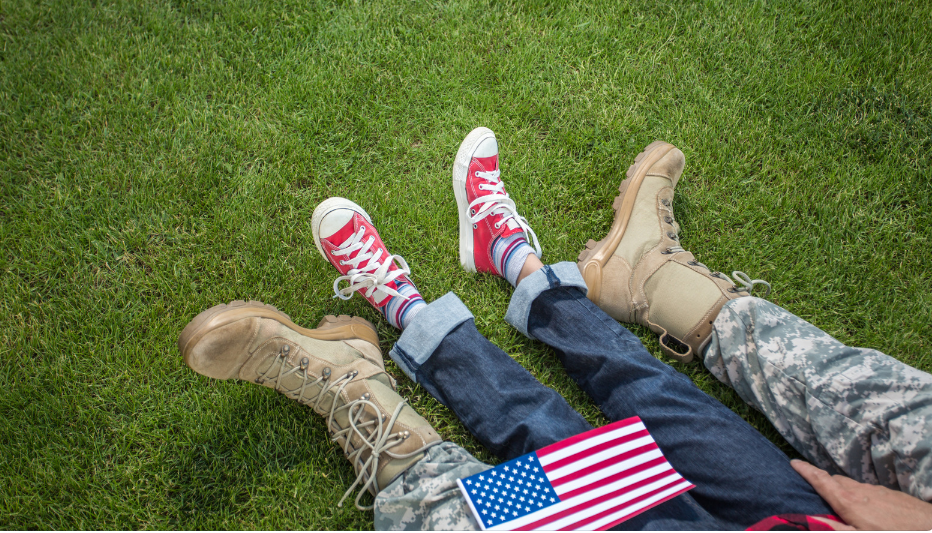ACEs and the Military Child

Early childhood experiences have a tremendous influence on the long-term health and well-being of your child—and for military children who face a unique set of challenges, the odds of having an adverse childhood experience (ACE) can be higher.
Luckily, there are many ways you can protect your child—from building social-emotional resilience to developing powerful community connections. At One Place, we are committed to supporting our military families through referrals to high-quality child care to strengthen a child’s overall well-being and much more.
Understanding Adverse Childhood Experiences (ACEs)
The term ACEs comes from a landmark 1998 study from the CDC that connected childhood adversity to higher risk for poor physical, mental, behavioral, and social outcomes in life. ACEs can take on various forms, including verbal, physical, sexual, and emotional abuse, physical neglect, divorce and separation of parents, physical abuse of a parent, alcohol or drug abuse by a parent, mental illness of a parent, and incarceration of a parent.
ACEs do not impact all children and demographics equally. Nationally, 61 percent of Black non-Hispanic children and 51 percent of Hispanic children have experienced at least one ACE compared with 40 percent of White non-Hispanic children. Income also plays a role: Studies have suggested that low socioeconomic status paired with social isolation are both major risk factors for ACEs.
In North Carolina, 23.3 percent of children have one ACE and 23.6 percent have experienced two or more adverse childhood experiences. With COVID-19 as a significant source of stress for many children and families, these numbers are likely to increase.
ACEs and the Military Child
While having a deployed parent is not an ACE in itself, many circumstances around having a parent in the military can contribute to ACEs for children.
Loss and Separation:
The landmark 1998 CDC ACE study focused on parental loss due to death, incarceration, or divorce—and found that long-term separation can have a deep impact on a child’s health. While the vast majority of parents return from deployment safe and sound, this separation can be challenging for a child’s mental and emotional health. Plus, for young children under the age of 11, their perception of time can vary as well, leading to confusion and stress.
Parents with PTSD, TBI, and Mental Illness:
When some service members return home, they may suffer from invisible injuries. Post-traumatic stress disorder (PTSD), traumatic brain injury (TBI), and mental illness may cause flashbacks, nightmares, anxiety, trouble sharing feelings or affection, challenges sleeping, angry outbursts, and general jumpiness. In severe cases, these invisible injuries may have a long-term impact on a child’s well-being and may be considered an ACE.
Substance Abuse:
ACE studies have addressed substance abuse issues, such as excessive drinking or drug use. The stresses of deployment and the unique culture of the military can result in smoking, unhealthy drinking, drug use, and risky behavior. More than one in ten veterans have been diagnosed with a substance use disorder—and for some children, living with someone who suffers from a substance abuse disorder can be an ACE.
Domestic Violence:
Between 2003 and 2010, intimate partner violence declined among civilians—however, among military personnel, it rose by a staggering 177 percent. Described as the “Forgotten Crisis,” intimate partner violence serves as a potential risk factor for military children who may witness intense and dangerous situations.
How to Support Your Family
Although military families face undeniable challenges, there are many ways to promote effective coping and build family resilience.
- Build family resilience. A positive figure in a child’s life can help build stability and security—while simultaneously reducing the impact of toxic stress and potential for ACEs. Take advantage of military family resources available to build your family’s resilience and strength.
- Connect with your greater community. The military community is also a community of parents—and many of the people in your unit are parents facing the same difficulties, challenges, and questions. Connecting with members of your community reminds you that you are not alone—and that you have access to a number of useful resources. MCCS Lejeune-New River frequently offers trainings and social activities for families to meet fellow members of their community. Reach out to your unit’s Family Readiness Officer or key spouse for more information.
- Reach out for help. We take a preventative approach when navigating military families and potential ACEs. By reducing stress in the lives of children and families in Onslow County, we can help lessen and eliminate ACEs in our community. Learn more about our approach here.
Questions? We’re here to help. If you’re a military family in Onslow County searching for support, reach out to us.
Sources
https://www.virtuallabschool.org/fcc/family-engagement/lesson-5
https://ssri.psu.edu/news/protective-factors-help-military-families-thrive
https://www.drugabuse.gov/publications/drugfacts/substance-use-military-life
https://www.centerforchildcounseling.org/aces-and-military-families/
https://www.pacesconnection.com/blog/phc-6534-preventing-aces-in-military-families
https://jamanetwork.com/journals/jamapsychiatry/fullarticle/1890091
